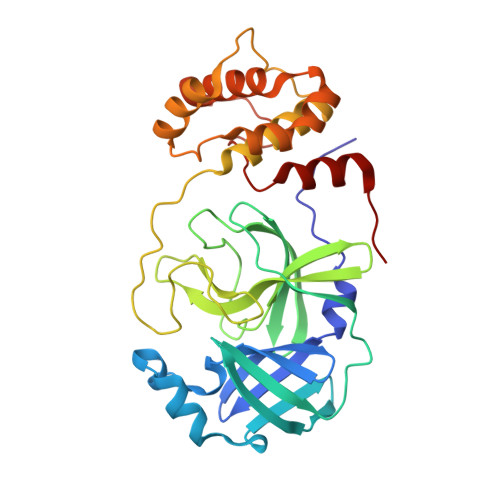Discovery of Potent Pyrazoline-Based Covalent SARS-CoV-2 Main Protease Inhibitors.
Moon, P., Zammit, C.M., Shao, Q., Dovala, D., Boike, L., Henning, N.J., Knapp, M., Spradlin, J.N., Ward, C.C., Wolleb, H., Fuller, D., Blake, G., Murphy, J.P., Wang, F., Lu, Y., Moquin, S.A., Tandeske, L., Hesse, M.J., McKenna, J.M., Tallarico, J.A., Schirle, M., Toste, F.D., Nomura, D.K.(2023) Chembiochem 24: e202300116-e202300116
- PubMed: 37069799
- DOI: https://doi.org/10.1002/cbic.202300116
- Primary Citation of Related Structures:
8SK4, 8SKH - PubMed Abstract:
While vaccines and antivirals are now being deployed for the current SARS-CoV-2 pandemic, we require additional antiviral therapeutics to not only effectively combat SARS-CoV-2 and its variants, but also future coronaviruses. All coronaviruses have relatively similar genomes that provide a potential exploitable opening to develop antiviral therapies that will be effective against all coronaviruses. Among the various genes and proteins encoded by all coronaviruses, one particularly "druggable" or relatively easy-to-drug target is the coronavirus Main Protease (3CL pro or Mpro), an enzyme that is involved in cleaving a long peptide translated by the viral genome into its individual protein components that are then assembled into the virus to enable viral replication in the cell. Inhibiting Mpro with a small-molecule antiviral would effectively stop the ability of the virus to replicate, providing therapeutic benefit. In this study, we have utilized activity-based protein profiling (ABPP)-based chemoproteomic approaches to discover and further optimize cysteine-reactive pyrazoline-based covalent inhibitors for the SARS-CoV-2 Mpro. Structure-guided medicinal chemistry and modular synthesis of di- and tri-substituted pyrazolines bearing either chloroacetamide or vinyl sulfonamide cysteine-reactive warheads enabled the expedient exploration of structure-activity relationships (SAR), yielding nanomolar potency inhibitors against Mpro from not only SARS-CoV-2, but across many other coronaviruses. Our studies highlight promising chemical scaffolds that may contribute to future pan-coronavirus inhibitors.
Organizational Affiliation:
Department of Chemistry, University of California, Berkeley, Berkeley, CA-94720, USA.



















